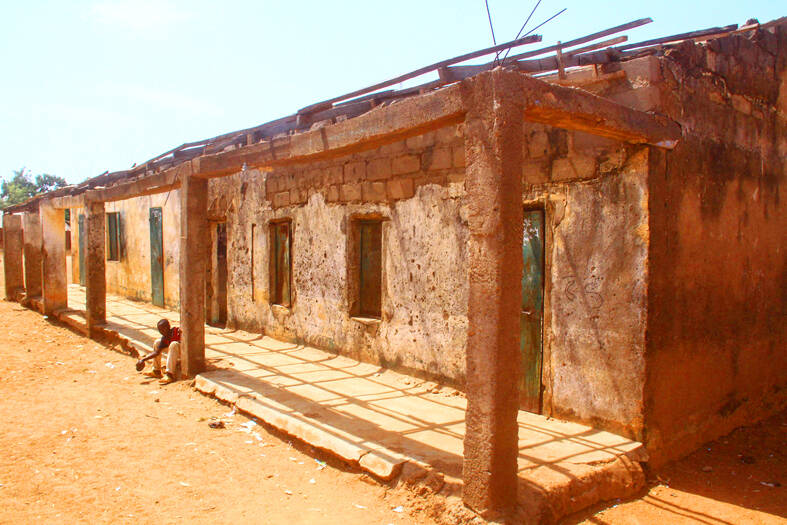More than 130 schoolchildren kidnapped by gunmen in northwestern Nigeria earlier this month were released unharmed yesterday, days before a deadline to pay a nearly US$681,000 ransom, officials and the army said.
The mass abduction in Kuriga, Kaduna State, on March 7 was one of the biggest attacks on a school in years and sparked a national outcry over insecurity.
The army said the hostages were freed in the early hours during a rescue operation.

Photo: AFP
Military spokesman Major General Edward Buba shared photographs of children wearing dust-coated uniforms in buses.
“The rescued hostages totaling 137 comprise of 76 females and 61 males. They were rescued in Zamfara State and would be conveyed and handed over to the Kaduna State Government for further action,” he said.
Teachers and residents previously said that about 280 pupils between the ages of eight and 15 were kidnapped when armed criminals known in Nigeria as bandits stormed the school on motorbikes.
Discrepancies between the number of people kidnapped and released are common in Nigeria due to unclear early reports and the return of those who go missing while fleeing attacks.
However, it was not clear why there was such a large difference between the figures this time.
Buba said that “all the captives had been rescued.”
He added that no troops had been wounded, but did not comment further, citing what he called the “ongoing operation.”
Nigerian President Bola Ahmed Tinubu welcomed the news and the “tireless dedication” of those who helped secure the children’s release.
Gangs routinely attack communities, loot villages and carry out mass kidnappings for ransom in northwest and northcentral Nigeria.
The gangs have targeted schools and colleges in the past, but there had been a lull in these attacks before the Kuriga abductions.
Last week, the gunmen demanded 1 billion naira (US$680,735) for the release of the missing children and staff. The government had said it would not pay the ransom.
Kidnap victims in Nigeria are often freed following negotiations with the authorities, although a 2022 law banned handing over money to kidnappers and officials deny ransom payments are made.
“The abducted Kuriga school children are released unharmed,” Kaduna State Governor Uba Sani said in a statement that did not specify how they were freed.
“This is indeed a day of joy,” he said, thanking “all Nigerians who prayed fervently for the safe return of the school children.”
Additional reporting by Reuters

UNITED: The premier said Trump’s tariff comments provided a great opportunity for the private and public sectors to come together to maintain the nation’s chip advantage The government is considering ways to assist the nation’s semiconductor industry or hosting collaborative projects with the private sector after US President Donald Trump threatened to impose a 100 percent tariff on chips exported to the US, Premier Cho Jung-tai (卓榮泰) said yesterday. Trump on Monday told Republican members of the US Congress about plans to impose sweeping tariffs on semiconductors, steel, aluminum, copper and pharmaceuticals “in the very near future.” “It’s time for the United States to return to the system that made us richer and more powerful than ever before,” Trump said at the Republican Issues Conference in Miami, Florida. “They

GOLDEN OPPORTUNITY: Taiwan must capitalize on the shock waves DeepSeek has sent through US markets to show it is a tech partner of Washington, a researcher said China’s reported breakthrough in artificial intelligence (AI) would prompt the US to seek a stronger alliance with Taiwan and Japan to secure its technological superiority, a Taiwanese researcher said yesterday. The launch of low-cost AI model DeepSeek (深度求索) on Monday sent US tech stocks tumbling, with chipmaker Nvidia Corp losing 16 percent of its value and the NASDAQ falling 612.46 points, or 3.07 percent, to close at 19,341.84 points. On the same day, the Philadelphia Stock Exchange Semiconductor Sector index dropped 488.7 points, or 9.15 percent, to close at 4,853.24 points. The launch of the Chinese chatbot proves that a competitor can

TAIWAN DEFENSE: The initiative would involve integrating various systems in a fast-paced manner through the use of common software to obstruct a Chinese invasion The first tranche of the US Navy’s “Replicator” initiative aimed at obstructing a Chinese invasion of Taiwan would be ready by August, a US Naval Institute (USNI) News report on Tuesday said. The initiative is part of a larger defense strategy for Taiwan, and would involve launching thousands of uncrewed submarines, surface vessels and aerial vehicles around Taiwan to buy the nation and its partners time to assemble a response. The plan was first made public by the Washington Post in June last year, when it cited comments by US Indo-Pacific Commander Admiral Samuel Paparo on the sidelines of the Shangri-La Dialogue

MARITIME SECURITY: Of the 52 vessels, 15 were rated a ‘threat’ for various reasons, including the amount of time they spent loitering near subsea cables, the CGA said Taiwan has identified 52 “suspicious” Chinese-owned ships flying flags of convenience that require close monitoring if detected near the nation, the Coast Guard Administration (CGA) said yesterday, as the nation seeks to protect its subsea telecoms cables. The stricter regime comes after a Cameroon-flagged vessel was briefly detained by the CGA earlier this month on suspicion of damaging an international cable northeast of Taiwan. The vessel is owned by a Hong Kong-registered company with a Chinese address given for its only listed director, the CGA said previously. Taiwan fears China could sever its communication links as part of an attempt